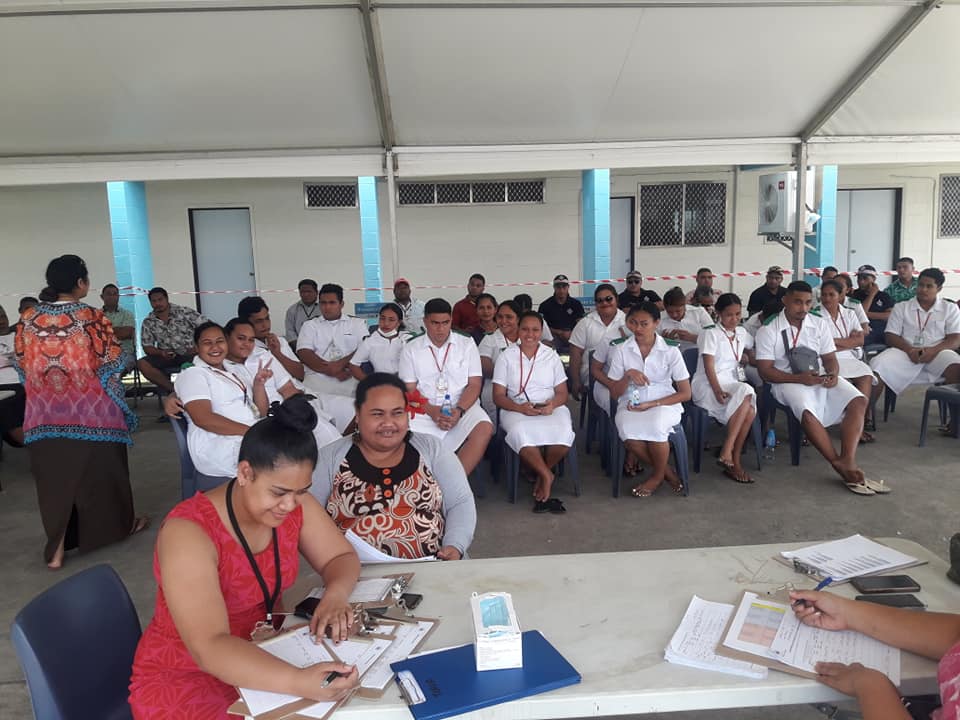
By Mataeliga Pio Sioa
Wholesale blame of the 2019 Measles Epidemic solely on the Ministry of Health was given final closure by the Prime Minister Tuilaepa Sailele Malielegaoi in Parliament last Friday.
PM Tuilaepa in a ministerial statement went over a difficult period for the health services that formed the backdrop to the measles outbreak in September 2019 up to 2020.
His account dated back to the time of the National Health Services (NHS) break away from the Ministry of Health (MOH) in 2008.
After having to struggle through many unresolved issues after the separation a re-merge was decided.
A threatened strike by protesting nurses in 2018 and a subsequent Commission of Inquiry recommendation hastened the re-merge under the MOH in April 2019.
Running in parallel to the health services reunion were criminal investigations on the death of two 1- year old babies from vaccination injections for measles, mumps and rubella (MMR).
A baby boy and girl died in Savaii in July 2018 who were later confirmed to have been injected with wrongly mixed measles immunisation vaccine.
“No parents wanted to have their children injected when that happened and it led to a high level of resistance to the immunisation programme,” the PM explained.
Opposition stiffened when anti-vaccination advocators and protesters joined in.
“Church people with their beliefs in the healing powers of faith in the Lord made the health immunisation programme work even harder.”
PM Tuilaepa highlighted the worsening resistance to parents who resorted to traditional herbal treatment to treat their babies measles rather than have them vaccinated.
“By the time the children were brought in to be vaccinated it was too late. “
He noted as well that during the mass vaccination many of the families were found to live only a few meters from the TTM Hospital but stayed away.
It showed up when the immunisation teams responded to the red flags outside their homes for mass vaccination injections.
“Mop up visits organised by the Ministry of Women and Social Developments to check on families also found still many not injected.”
The findings further confirmed strong remaining resistance to the injections.
Both the PM and the Minister of Health rejected a media report that blamed the Ministry of Health for not responding to an earlier advise for the restart of immunisation.
The advise was to the National Heath Services (NHS) in 2018 from the Ministry of Health in its advisory role as the regulatory body for health services.
The Director General Of Health, Leausa Dr. Take Naseri, who took over the MOH after the re-merge confirmed the advise as part of a report on important areas for the NHS to undertake to improve the service.
The report was made long before the re-merge in 2019 to revert all health services under the Ministry.
Leausa shouldered the bulk of the blame sparked by media reports during the measles epidemic for the outbreak.
Former Deputy PM Fiame Naomi raised similar blame in the Parliament session by questioning why the MOH did not react to the warning red flags of the epidemic before it happened.
PM Tuilaepa, however, responded with a lecture to remind his former deputy of the ‘collective responsibility’ of Cabinet.
“Before you accuse anyone, look first at where the fingers are pointed to see the ones pointed back at you.
“ The principles of ‘collective responsibility’ are about sharing equal responsibility and the integrity of confidentiality in Cabinet decisions.”
He was referring to the MP sitting in Cabinet at the time privy to all the health briefings on the measles epidemic fully aware of the work being done.
The 2019 Samoa measles outbreak began in September 2019.
As of 6 January 2020, there were over 5,700 cases of measles and 83 deaths.
The PM’s ministerial statement turned the attention of the House to the supportive reaction by a World Bank delegation to the re-merging of the separated health services under the Ministry of Health.
He said the delegation was fully aware of the problems with the model Samoa adopted from New Zealand who had copied it from the United Kingdom.
Promises were made for the World Bank to fund the health changes that they fully agreed with and ready to endorse.
